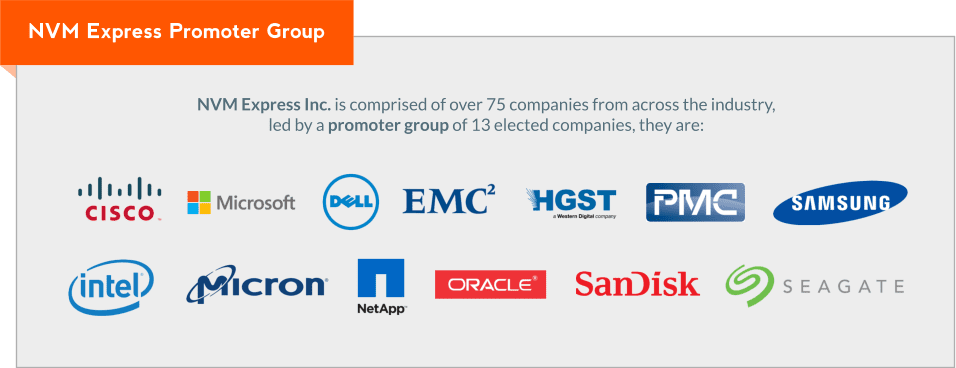Nội dung
NVMe is the best communication standard for the current SSDs introduced to the market, catering to both the PC and enterprise server segments. It was introduced in 2011 by a group of 13 members, including industry giants like Dell, Intel, Samsung, Microsoft, and several other companies.

NVME Group
In recent years, AZDIGI has also integrated this type of storage into its services, such as Turbo Business Hosting, Premium Business Hosting, and Platinum VPS, aiming to provide superior experiences for businesses.
So, how does an NVMe SSD actually accelerate website speed? This article will help you answer that question for customers.
What is an NVMe SSD?
NVME stands for Non-Volatile Memory Express, where:
- Non-Volatile refers to memory that retains data even when the computer is restarted.
- Expresssignifies high speed, referring to data being transmitted via PCI Express. This means that the SSD is directly connected to the motherboard instead of going through a SATA (Serial Advanced Technology Attachment) controller, resulting in faster transmission speeds.
In essence, compared to a SATA drive, an NVMe SSD offers faster data transfer speeds.
How does an NVMe SSD accelerate website speed?
Faster data transmission
As mentioned earlier, compared to SATA drives, NVMe SSDs utilize the PCI Express standard, enabling them to achieve maximum transfer speeds of up to 985MBps per lane. NVMe drives can utilize up to 4 lanes, which means they can reach maximum speeds of nearly 3940MBps. In contrast, the fastest SATA SSDs typically have read and write speeds of around 560MBps.
Customers can experience the difference in faster data transfer when AZDIGI provides data transfer speeds of at least 100MB/s for hosting packages using NVMe, instead of the typical 10MB/s offered by other providers.
Low latency
Since NVMe drives connect directly to the CPU via the PCI Express interface, they bypass the SATA controller, resulting in shorter communication paths and reduced latency. This lower latency contributes to superior performance and productivity.
For hosting, the low latency of NVMe drives is particularly beneficial for accelerating database applications, where numerous queries are sent per second. Each query can benefit from approximately 50% time savings on an NVMe drive compared to a traditional SSD, significantly reducing website processing time.
High performance
Compared to traditional SSDs, NVMe drives support more than 64K I/O queues and process 64k commands per queue, achieving up to 1,000,000 IOPS (Input/Output Operations Per Second). Leveraging parallel data reading and writing, NVMe drives can deliver read and write speeds of up to 10GB/s, over 15 times faster than traditional SSDs.
With near 10GB/s read and write speeds, customers can significantly boost website speed, as data read and write operations are up to 10 times faster than with traditional SSDs.
Conclusion
Currently, in addition to using NVMe drives in their services, AZDIGI also combines them with RAID 10 setup in Turbo Business Hosting, enhancing both read and write speeds while ensuring the highest level of data safety by employing RAID-10 with 8 U.2 standard NVMe drives.
Refer to AZDIGI’s services utilizing NVMe drives here.

